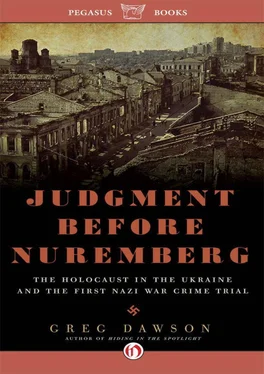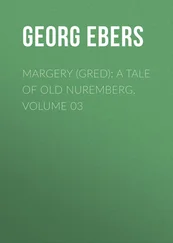While Hitler did not succeed in making “this Volk disappear from the Earth,” he destroyed most of European Jewry in trying—and he began here, in Ukraine, in the summer of 1941. Upwards of a million Ukrainian Jews—give or take 100,000 “kikes” as Himmler, who often used the slur, might have blithely put it—were shot and dumped like garbage in mass graves in their native soil before the first Jews died in the gas chambers at Auschwitz-Birkenau in March of 1942.
In their later retreat from Ukraine, the defeated Nazis attempted to destroy the evidence of their mass murder by digging up and burning the corpses, but there were too many corpses and not enough time. Witnesses told of the earth at the killing fields moving, heaving like a distended belly from the gases emitted by thousands of decomposing bodies, blood seeping up to the surface. The gassings—and ovens—at Auschwitz were antiseptic in comparison.
The slaughter by gunfire in Ukraine should have become Hitler’s original sin and Babi Yar—where 34,000 Jews were murdered in two days—the darkest icon of the Shoah. But when the war ended, Stalin abetted Himmler’s coverup by throwing an Iron Curtain around the crime scene, off limits to writers, journalists, and historians. The only deaths in the great war to defend the Motherland would be “Russian” deaths. And so, by default, the liberation of Auschwitz and other camps became the defining images of the Holocaust. Hitler’s crime in Ukraine began to fade slowly from public view and consciousness till it became what it is today—barely a footnote in popular understanding of the Holocaust.
By the 1970s when “Never forget” had become a familiar mantra of Holocaust remembrance, the Holocaust in Ukraine had already been forgotten, if it had even been remembered to begin with. It was as an ironic fulfillment of Himmler’s macabre coverup—as if the Nazis had actually succeeded in unearthing and burning the evidence of their monstrous crime.
On a Thursday night in February 2008, I was slicing vegetables for dinner in the kitchen of our Orlando home and half listening to the NBC Nightly News when anchorman Brian Williams said something that made me look up.
“Tonight some extraordinary reporting by our friend and colleague Ann Curry. It’s a story of a kind of invisible part of the Holocaust where more than a million Jews simply disappeared,” Williams said, using the same portentous inflection reserved for discovery of a lost tribe in New Guinea or ice crystals on the moon. Curry did not skip a beat.
“In fact, this is stunning new information about an unknown part of the Holocaust,” she reported. “We are learning in detail now about what happened to 1.3 million Jews who simply disappeared in Ukraine between 1941 and 1944.”
It was a surreal moment that made me want to check the calendar. Was it really 2008? Was NBC News—67 years after the fact—really reporting the Holocaust in Ukraine as “news”? So it seemed. It’s hard to find a better working definition of “news” than “stunning new information.” The pretext—or “hook,” in journalese—for Curry’s story was Father Patrick Desbois, a French Catholic priest who had undertaken the noble mission of finding undiscovered killing fields in Ukraine and interviewing witnesses to the shootings. He told his story in Holocaust by Bullets , published in 2008.
Father Desbois had not, as the NBC report breathlessly suggested, solved a great historical mystery—a vanishing act by a million Ukrainian Jews. Rather, he had corroborated and shed welcome new light on the voluminously documented Nazi Holocaust in Ukraine. And although the professional journalists at NBC should have checked the record before presenting “new information” that was not, Curry’s report undoubtedly was news to virtually everyone watching. That would have included me too, had I not spent the previous eight years researching and writing Hiding in the Spotlight.
Curry’s report was stark illustration of how completely the Nazi crimes in Ukraine have been erased from our collective memory and body of common knowledge about the Holocaust. NBC was not the first or last to rediscover the story. In recent years there has been a spate of reports, most focusing on the Einsatzgruppen , mobile killing squads which followed the German army across Ukraine, murdering Jews. Like Curry’s story, these reports, many an hour long, come packaged as “news,” like “Hitler’s Hidden Holocaust,” which aired on The National Geographic cable channel in September 2010.
The historical amnesia, the deep black hole, is not confined to the general reading public or TV audience—it can be found among those who have made study of the Holocaust their lifework. A focal point of this book is the first trial—and conviction and execution—of Nazis for their wartime crimes. It was held in Kharkov in December 1943, well before the end of the war and the celebrated postwar trials in Nuremberg, Germany. I have encountered Holocaust scholars in the U.S. who know nothing about this trial, though it’s no historical secret. The trial and executions—witnessed by tens of thousands of Kharkov residents—were reported in The New York Times, The Christian Science Monitor, Time, and Life Magazine , which even included photos.
Time and inattention have since relegated these facts to a netherworld of library archives and academic symposia. The seminal event of the Holocaust—the rape of Ukraine—has become obscure knowledge held by a tiny priesthood of professional historians and amateur aficionados. I had come to my mother’s homeland a second time to gather material for a book that I hoped would help elevate Ukraine from the footnotes to the forefront of Holocaust history where it rightfully belongs.
I was not prepared for the sense of being surrounded by spirits in the corporeal form of the Ukrainians all around me. Touching my mother’s name on the wall of the dead four years earlier at Drobitsky Yar—my own epitaph, in a way—sent an existential shiver up my spine, and it cloaked all I surveyed in an air of unreality, as if I were visiting a parallel universe populated not by the living but by symbols and apparitions.
After two hours in the waiting area of Terminal A, we were informed that landing conditions had improved in Kharkov and we were herded back onto the shuttle bus. The adult travelers stood silent or murmuring in the rolling ice box. A few feet away from me, the same exuberant young girl who had lit up the dreary terminal with her theatrics now jumped up onto a seat, grabbed the overhead straps, and was showing off—twisting, turning, swaying, pretending to fall—her smiling eyes alive with mischief and pure joy.
“Mama!” she cried. “Papa!”
Her seated parents cast mock scowls and waved for her to get down, but the show went on. At that moment, I thought that she was the happiest child I had ever seen. This was a peculiar reaction. After all, I had seen a lifetime of happy children on playgrounds. What was it about this child that filled me with such joy and also, oddly, deep melancholy?
In this beaming, blithe spirit I saw my mother as I imagine her at eight, a carefree wanderer in her beloved seaside hometown of Berdyansk in southern Ukraine when life was good, before the storm.
And so it was everywhere I went in Ukraine—spirits and flashbacks and omens. On the flight to Kharkov, the flight attendant serving us was “Marina,” the fictitious name used by my mother’s sister, Frina, during the war. On the side of a bus in Kharkov was a poster for a young entertainer named Zhanna, my mother’s name, who became a pianist and was performing around Ukraine by the time she was ten. I visited the school in Kharkov my mother attended when she was thirteen and spoke to a class of students the same age. Looking out at the sea of fresh faces, I saw… survivors.
Читать дальше












